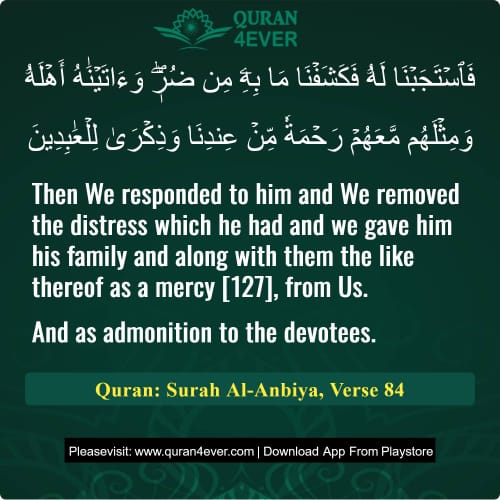
Transliteration:( Fastajabnaa lahoo fakashaf naa maa bihee min durrinw wa aatainaahu ahlahoo wa mislahum ma'ahum rahmatan min 'indinaa wa zikraa lil'aabideen )
"Then We responded to him and We removed the distress which he had and We gave him his family and along with them the like thereof as a mercy [127], from Us. And as admonition to the devotees."
In response to Hazrat Ayyub’s (peace be upon him) heartfelt prayer, Allah not only removed all his suffering, but also restored his blessings in a miraculous way.
According to tafseer, a fountain miraculously appeared from an unknown source when he rubbed his feet on the ground. By bathing in and drinking from this water, all his external wounds and internal ailments were healed completely.
Allah also returned his previously deceased children to life, made his wife young again, and even granted him additional children, thereby doubling his family. This entire restoration was a manifestation of Allah’s special mercy.
This verse also serves as a reminder and lesson for all true worshippers: that patience, steadfastness in trial, and sincere dua can turn loss into abundance and pain into honour, when one remains devoted to Allah with full trust.
The tafsir of Surah Anbiya verse 84 by Ibn Kathir is unavailable here.
Please refer to Surah Anbiya ayat 83 which provides the complete commentary from verse 83 through 84.
(21:84) We accepted his prayer and removed the affliction[78] from him, and We not only restored to him his family but as many more with them as a mercy from Us and as a lesson to the worshippers.[79]
78. How his disease was cured has been explained in (Surah Suad, Ayat 42): Stamp the ground with your foot: here is cool water for you to wash with and to drink. From this it appears that no sooner did he stamp the ground than a spring gushed forth. He took bath and drank the water and was cured of his disease. The nature of the treatment hints that he was suffering from a skin disease. This is confirmed by the Bible as well. Satan smote Job with sore boils from the sole of his foot unto his crown. (Job, 2:7).
79. It will be worthwhile to compare the high character of Prophet Job as given in the Quran with that in the Book of Job in the Bible. The Quran presents him as a veritable picture of patience and fortitude and an excellent model for the worshippers of Allah, but his general picture presented in the Book of Job is that of a man who is full of grievance against God: Let the day perish wherein I was born, and the night in which it was said, There is a man child conceived. Let them curse (the night) that curse the day. Because it shut not the doors of my mother’s womb, nor did sorrow from mine eyes. Why died I not from the womb? (Chapter 3). Oh that my grief were thoroughly weighed, and my calamity laid in the balance together, the arrows of the Almighty are within me, the poison whereof drinketh up my spirit: the terrors of God do set themselves in array against me. (Chapter 6) I have sinned; what shall I do unto thee, O thou preserver of men? Why hast thou set me as a mark against thee, so that I am a burden to myself? And why dost thou not pardon my transgressions, and take away my iniquity? (Chapter 7: 20-21).
His three friends try to console him and counsel patience, but in vain. He says: My soul is weary of my life. I will speak in the bitterness of my soul (10:1). I have heard many such things: miserable comforters are ye all. (16:2). So these three men ceased to answer Job. Then was kindled the wrath of Elihu against Job, because he justified himself rather than God.” (32:1-3), but he also failed to console him. Then the Lord himself came down and condemned the three friends and Elihu and rebuked Job and then forgave him, accepted him and blessed him. (Chapters 41, 42). It should be noted that in the first two chapters of this Book, Prophet Job is presented as a perfect and upright man who feared God, but in the following chapters he becomes an embodiment of grievance against God, as though the estimate of Satan about him was correct and that of God incorrect. Thus this Book itself is a clear evidence that it is neither the word of God nor of Prophet Job but had been written afterwards by some literary man and incorporated in the Bible as a scripture.

For a faster and smoother experience,
install our mobile app now.
Related Ayat(Verses)/Topics